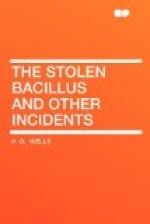“I don’t like ’em,” said his housekeeper, suddenly shivering and turning away. “I know it’s very silly of me—and I’m very sorry, particularly as you like the thing so much. But I can’t help thinking of that corpse.”
“But it may not be that particular plant. That was merely a guess of mine.”
His housekeeper shrugged her shoulders. “Anyhow I don’t like it,” she said.
Wedderburn felt a little hurt at her dislike to the plant. But that did not prevent his talking to her about orchids generally, and this orchid in particular, whenever he felt inclined.
“There are such queer things about orchids,” he said one day; “such possibilities of surprises. You know, Darwin studied their fertilisation, and showed that the whole structure of an ordinary orchid-flower was contrived in order that moths might carry the pollen from plant to plant. Well, it seems that there are lots of orchids known the flower of which cannot possibly be used for fertilisation in that way. Some of the Cypripediums, for instance; there are no insects known that can possibly fertilise them, and some of them have never be found with seed.”
“But how do they form new plants?”
“By runners and tubers, and that kind of outgrowth. That is easily explained. The puzzle is, what are the flowers for?
“Very likely,” he added, “my orchid may be something extraordinary in that way. If so I shall study it. I have often thought of making researches as Darwin did. But hitherto I have not found the time, or something else has happened to prevent it. The leaves are beginning to unfold now. I do wish you would come and see them!”
But she said that the orchid-house was so hot it gave her the headache. She had seen the plant once again, and the aerial rootlets, which were now some of them more than a foot long, had unfortunately reminded her of tentacles reaching out after something; and they got into her dreams, growing after her with incredible rapidity. So that she had settled to her entire satisfaction that she would not see that plant again, and Wedderburn had to admire its leaves alone. They were of the ordinary broad form, and a deep glossy green, with splashes and dots of deep red towards the base. He knew of no other leaves quite like them. The plant was placed on a low bench near the thermometer, and close by was a simple arrangement by which a tap dripped on the hot-water pipes and kept the air steamy. And he spent his afternoons now with some regularity meditating on the approaching flowering of this strange plant.
And at last the great thing happened. Directly he entered the little glass house he knew that the spike had burst out, although his great Palaeonophis Lowii hid the corner where his new darling stood. There was a new odour in the air, a rich, intensely sweet scent, that overpowered every other in that crowded, steaming little greenhouse.




